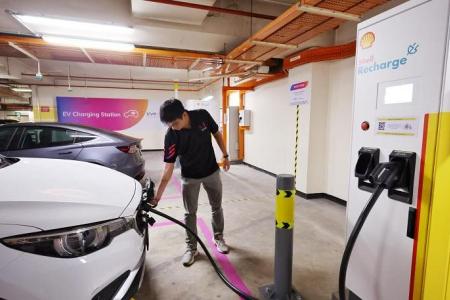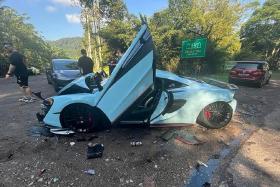EV chargers installed at 700 HDB carparks; new public fast chargers in Toa Payoh, Punggol
Drivers here now have more places to juice up their electric vehicles (EVs), as more than 2,400 charging points have been installed at about 700 Housing Board residential carparks across all 26 HDB towns, to date.
Drivers of taxis, private-hire cars and commercial fleet vehicles that run on electricity can also top up their batteries much faster, with the roll-out of the first public fast chargers in HDB commercial carparks.
With these fast chargers, drivers can get half of a full charge in 30 minutes, on average, said EV-Electric (EVe) Charging, a Land Transport Authority subsidiary overseeing the deployment of public EV chargers, on Jan 18.
The new chargers are in two HDB commercial carparks – at the HDB Hub in Toa Payoh and the Oasis Terraces neighbourhood centre in Punggol.
Launching the fast chargers at an event at HDB Hub on Jan 18, Senior Minister of State for Transport Amy Khor said the authorities will look to deploy fast chargers at other HDB neighbourhood and town centres as well as JTC Corporation industrial estates that fleet drivers frequent.
She said more details will be made public in the coming months.
Dr Khor, who is also Senior Minister of State for Sustainability and the Environment, said: “We have achieved the interim target of equipping one in three HDB carparks with EV chargers by 2023.”
“The accessibility of EV chargers really is an important factor to encourage the switch from ICE (internal combustion engine) vehicles to electric vehicles,” she added.
“Over the next couple of years, we will deploy these EV chargers to the remaining HDB carparks to ensure convenience.”
The Government’s aim is to install at least 12,000 EV chargers in about 2,000 HDB carparks by 2025.
At the carpark in HDB Hub, Shell now operates four fast charging points, powered by two 120 kilowatt (kW) direct current (DC) dual-gun chargers. There will also be two 22kW alternating current (AC) chargers there.
At Oasis Terraces in Punggol, SP Mobility will run two fast charging points, powered by a single 100kW DC dual-gun charger. In addition, there will be four 22kW AC chargers.
Unlike AC chargers, a DC charger has a converter inside the charger. That means it can feed power directly to the car’s battery and does not need the vehicle’s on-board converter.
Each dual-gun charger can juice up two EVs at the same time.
With these fast chargers, EV drivers will be able to get a quick boost that will give them an extra 100km to 200km in mileage with a 30-minute to one-hour charge, Dr Khor said.
In contrast, charging a vehicle such as the MG5, which cab operator Strides Premier uses as a taxi, takes about 8½ hours using a slow charger.
EVe said the decision to deploy fast chargers at HDB carparks came in response to industry feedback.
Right now, most fast chargers are at commercial places such as malls and offices. The company said heavy EV users such as cabbies and fleet drivers had asked for more fast chargers at public carparks, where parking rates are more affordable, and where there are amenities such as coffee shops and hawker centres.
Dr Khor said overnight slow charging, however, remains the predominant charging strategy for private electric cars, adding that most drivers will need to charge their EVs only once every five or six days if they clock an average daily mileage of 50km.
She said: “While slow chargers will meet the needs of most EV drivers, we also recognise that fast chargers are needed as a supplement.”
Dr Khor noted that new electric car registrations formed 18.2 per cent of all new car registrations in 2023 – 50 per cent more than in 2022, and almost five times compared with 2021.
In November 2023, registrations for “cleaner energy” cars, which include fully electric and hybrid cars, crossed 75 per cent of all car registrations for the first time, she added.
There are now almost 11,000 fully electric cars on the roads here, and more than 15,200 EVs, after including other vehicle classes such as taxis and motorcycles.
As part of the Singapore Green Plan 2030, the Government’s aim is for all vehicles here to run on cleaner energy by 2040, with the registration of new diesel cars and taxis to stop from 2025 and the registration of new pure combustion engine cars to end from 2030.
While EV adoption has climbed, the shortage of EV chargers has been a sticking point for drivers yet to make the switch.
In November 2022, five companies were picked to roll out EV chargers at 2,000 public carparks under a large-scale tender.
This was part of the Government’s move to encourage greater adoption of EVs by expanding the charging network to tackle “range anxiety”, a common concern among drivers that their cars will run out of power before reaching a charging station.
The bulk of the chargers installed as part of the large-scale tender are 7.4kW slow chargers that are mostly located on the third deck of HDB multi-storey carparks.
The large-scale tender followed an earlier one awarded in September 2021 to install more than 600 charging points in public carparks.
Singapore aims to have 60,000 EV charging points by 2030, of which 40,000 will be in public carparks and 20,000 on private premises such as malls and condominiums.
Get The New Paper on your phone with the free TNP app. Download from the Apple App Store or Google Play Store now



